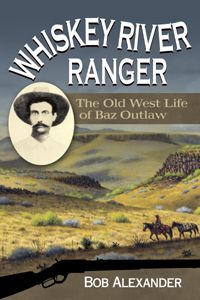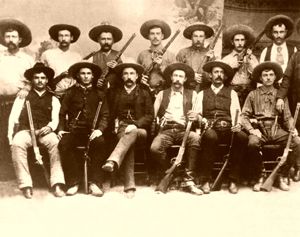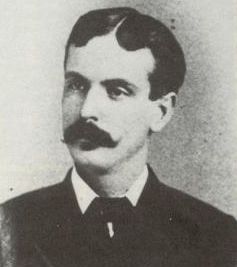By Bob Alexander

Get your copy of Bob Alexander’s Whiskey River Ranger: The Old West Life of Baz Outlaw from University of North Texas Press.
University of North Texas Press, 2016 – Captain Frank Jones, a famed nineteenth-century Texas Ranger, once said when reflecting on his company’s top sergeant, Baz Outlaw, “[He is] a man of unusual courage and coolness and in a close place is worth two or three ordinary men.” However, not every Texas Ranger viewed the ironically named Baz Outlaw in so positive a light. As such, he was described by some as “one of the worst and most dangerous.” Like any great Old West tale, Baz Outlaw’s true-life story is jam-packed with Texas Rangers, horseback chases, explosive train robberies, vigilante justice (or injustice), nighttime ambushes, bushwhacking sheriffs, and of course, a duel. In Whiskey River Ranger, Bob Alexander gives a balanced account of this infamous Texas Ranger, his heroic triumphs, legendary courage, but also his dangerous temper, and his losing battle with alcoholism.
The following is an excerpt from noted author Bob Alexander’s 2016 book Whiskey River Ranger: The Old West Life of Baz Outlaw, courtesy of UNT Press.
Chapter 10 – Undaunted Courage and Fine Generalship
Springtime of 1893 had closed, finding U.S. Deputy Marshal/Special Ranger Baz Outlaw sitting in a reasonably good position career-wise. Certainly, despite the intermittent drunken and messy imbroglios of the past, maybe his word about foregoing taking a drink would stand good. Unquestionably, several Big Bend Country folks thought he was yet the man to turn to in a crisis. John Humphries, the storeowner previously advancing Baz cash in lieu of Captain Frank Jones forwarding Outlaw’s quarterly pay vouchers, apparently had forgotten and/or forgiven—or it never had amounted to too much in the first place. Subsequent to some intricate consultations of a serious nature, John Humphries carried the message. Civilian Humphries wrote to Baz Outlaw, enjoining him to exercise his authority as a federal officer: Proclaiming to the deputy marshal that the “Mescal business” at the Chispa Coal Mines must be stopped. The novice would-be lawmen had concocted what they believed was an ingenious plan. As it was spelled out to the Deputy U.S. Marshal, they would furnish him—loan him—a Winchester, horse, and saddle for the job. (1) Then he could
go out dressed as a miner and loiter at the mining camp [manager’s camp] during the heat of the day, so as not to get into [the laborers’] camps till after dark on Thursday, Then Friday and Sat night you can lay for them across the Canyon… (2)

Texas Rangers Company D 1887 in Realitos, Texas Back Row from left Jim King, Baz Outlaw, Eiley Boston, Charles Fusselman, Hr.Durbin, Ernest Rogers, Charles Barton, Walter James (Cut out of this version of the photo). Sitting Bob Bell, Cal Aten, Captain Frank Jones, Walter Durbin, Jim Robinson, Frank Schmidt
There was nothing ambiguous regarding the request or about asking Baz Outlaw – the well-known and well-liked Big Bend area lawman – to fix the perceived or real smuggling problem. That he had been exiled from the thought processes or physically banished from the region by several of the Big Bend Country’s movers and shakers would register as an oversized misnomer, as gigantic as that picturesque Far Wild Country itself. At the time, while grading his scorecard about challenging whiskey river’s rapids would have earned dismal marks, Baz, as everyone at Alpine and Marfa and along the Rio Grande knew, had undertaken a pledge to paddle his canoe through calmer waters. Should he stand tall, honoring that promise there no doubt would be good days in store for the reformed – abstainer – alcoholic Baz Outlaw. In another book, on another page, good days were numbered for Captain Frank Jones.
Subsequent to his marriage to divorcee Helen Baylor Gillett and after thoughtful analysis of the myriad of pleas and petitions that a company of Rangers be deployed to El Paso County, the Company D headquarters camp had been shifted to Ysleta. Sergeant Hughes remained behind in the Big Bend Country with a little detachment to cover a lot of ground. At this time, the principal evildoers along El Paso County’s portion of the Texas/Mexico borderlands were the Olguins, a bloodline crime family leading what was commonly referred to as the Bosque Gang. Consulting a dictionary is not necessary, but were one so studiously inclined, it would be quite evident that by simple definition, members of a gang – are gangsters. From the gang’s patriarchal leader, Clato Olguin, somewhat semi-retired due to age, the family tree was choked with sons and grandsons own- ing prison records and thefts and murders and at least one conviction for rape to their heinous credit. Too, a horde of minions unrelated by blood were also part of the setup, and with blood on their hands had proved themselves worthy of initiation into the despicable outfit. Through and through they were one and all, gangsters to the core. They, too, were nonpartisan, sadistically preying on Texans, Tejanos, and Mexicans alike. Company D’s first major thrust following the June 1893 transfer into El Paso County was to step on the Olguins’ necks: Figuratively if possible, literally if necessary.(3)
Lamentably on the thirtieth day of June, it was the Olguins and their crew wearing the boots of dominance, not the Texas Rangers. Shifting Rio Grande sands had confusingly channeled an island, Pirate Island, a piece of real estate with an imaginary line down the middle separating the sovereignty of Texas and Mexico. And it was there that Captain Frank Jones and Corporal Carl Kirchner, along with Privates Eddie Aten, T.F. Tucker, Wood Saunders, and Ed Bryant, were kicked hard, the life figuratively stomped out of Captain Frank Jones when bushwhackers’ bullets ripped into his body – a dead man on Mexico’s side of the line. The Rangers’ retreat was not pretty, but it was compulsory. Mexican soldiers were riding hard due to verbal reports and cracking sounds of gunfire; armed Texans had invaded their country – bullets, not diplomats would settle the score. And so, the living Texas Rangers shrewdly skedaddled.(4)

Get your copy of Bob Alexander’s Whiskey River Ranger: The Old West Life of Baz Outlaw from University of North Texas Press.
Though much can be and has been written about Baz Outlaw with negative connotations and, for particular episodes rightly so, he hardly ever was or could be criticized with characterizations of being a wallflower. At once, upon learning of the Pirate Island shoot-out and Frank Jones’ demise, wearing his Special Ranger hat Baz Outlaw sent a telegram to the adjutant general with his itinerary: “Capt Jones was Killed near Ysleta by thieves today will go up on first train do all I can to capture murderers.” (5)
Even with the understandable chaos and turmoil, Special Ranger Outlaw – either on the train or at his room in the Lindell Hotel at El Paso -realized he still owed Texas Ranger headquarters his monthly report for June. Taking pen in Special Ranger Outlaw posted the adjutant general with compulsory mention of an arrest and other tidbits of news he supposed would be of interest to the Frontier Battalion’s headman: “On acct of leaving Alpine to assist in recovering Captain Jones’ body I am late in Sending report. Arrested Wm Louis in Brewster Co on 15th June, Assault and Attempt to Murder. I arrived at Ysleta yesterday with Seven Men but was too late to get to the River before the Mexican authorities had delivered the Captain’s body – Which was intered [sic] yesterday at Ysleta with Masonic honors! His wife is in very delicate health and I think it doubtful about her recovery from the Shock! There is a hard gang of Mexicans in the vicinity and Several bad White Men that assist them in their depredations. I think that Captain Jones’ body lay in the Sun Nearly all day & was in a bad condition—his wife was not allowed to look at it. My address for the Ensuing month will be at Alpine.” (6)
What Baz Outlaw failed to mention, presumably because he was wholly unawares, it would seem that Frank B. Simmons, since elected to Sheriff of El Paso County, had been in some form or fashion forced to bend to the well-known and well-accepted borderland practice colloquially known as the bite – la mordida – the bribe. Reading between the lines of Sheriff Simmons message to Governor Hogg is necessary but not complicated:
I have been to quite an expense in getting the body of Captain Frank Jones, Company D State Rangers from Mexico. Will the state help me pay these expenses. . . .(7)

Bass “Baz” Outlaw
Read the rest of chapter 10 and the entire new novel “Whiskey River Ranger: The Old West Life of Baz Outlaw, by author Bob Alexander. Available through University of North Texas Press.
Foot Notes in this artlcle:
1. John Humphries to Baz Outlaw, June 22, 1893, in HML&HC.
2. Ibid.
3. Readers interested in a more inclusive examination of the political maneuverings and analysis of criminal intelligence that fostered Company D’s deployment to El Paso County and a cursory genealogical peek at the Olguin crime family may wish to consult Alexander’s Six-Shooters and Shifting Sands, particularly Chapter 15, “Boys, I’m Killed.”
4. The actual events of this particular incident—a truly horrific gunfight between bandits and Rangers—are also covered in detail, based on primary source documents, in Alexander’s Riding Lucifer’s Line, Chapter 9, 127–138.
5. Telegram, Special Ranger Outlaw to AG Mabry, June 30, 1893, TSA.
6. Special Ranger Outlaw to AG Mabry, July 2, 1893, TSA.
7. Sheriff Frank B. Simmons, El Paso County, to Governor Hogg, July 7, 1893, TSA; Parsons, Captain John R. Hughes, puzzlingly proffers: “Sheriff Simmons did not realize that Kirchner had recovered the body, and anticipated trouble in attempting to do so.” 87; In real time Corporal Carl Kirchner certainly wasn’t confused: “We [an editorial ‘we’] then made a demand on the chief officer at Juarez, Mex. Who acted very nicely (I am told by Sheriff Simmons who made the demands) & ordered the body delivered to us at the State line.” See, Corporal Carl Kirchner to AG Mabry, July 2, 1893, TSA; Nor were newspapermen at faraway Dallas, Texas, baffled: The Dallas Morning News of July 1, 1893, picking up the story from El Paso, reported: “The sheriff’s posse and rangers returned to Ysleta and El Paso this evening with the body of Captain Frank Jones of the rangers, who was killed across the Mexican line yesterday morning at sunrise while in pursuit of a gang of smugglers and murderers in the bosque, twelve miles below San Elizario in this county.” And the edition of July 2, 1893: “The murder of Captain Frank Jones by Mexicans yesterday morning is still causing much excitement on the border. The sheriff’s posse, which made a demand on the Mexicans for Captain Jones’ body, met with refusal, backed by 100 armed Mexicans. Sheriff Simmons was taken by a special train to Juarez, Mexico, where he made a request on the Mexican war department for the necessary aid and the lieutenant commanding at once repaired to the scene of trouble with a troop of cavalry and gave the sheriff the necessary help, which secured the body at 11 a.m.” Additionally, the Dallas Morning News of December 19, 1893: “. . . Sheriff F.B. Simmons of El Paso county was in the city yesterday. It was he who on the 30th of last June, recovered the body of Capt Frank Jones, who was killed at Tres Jacales, in the state of Chihuahua, Mexico.” Also, C. L. Sonnichsen, Pass of the North: Four Centuries on the Rio Grande: “Next day Sheriff Simmons and a posse demanded the body of the dead Captain, but got nowhere until the Mexican authorities were asked to help. Lieutenant Rafael García Martínez, the Juárez jefe politico, rode with Simmons down the Mexican side of the border with a Mexican police escort. They had better luck than they expected, for not only did they bring home the body of Captain Jones—they met three members of the gang making their way out of the brush and rounded them up without a fight.” 315.
© University of North Texas Press, Bob Alexander, with permission to reprint on Legends Of America, April 2016, updated November 2022.
About the Author:

Get your copy of Bob Alexander’s Whiskey River Ranger: The Old West Life of Baz Outlaw from University of North Texas Press.
BOB ALEXANDER began a policing career in 1965 and retired as a special agent with the U.S. Treasury Department. He is the author of Rawhide Ranger, Ira Aten (winner of WWHA Best Book Award); Six-Shooters and Shifting Sands, Bad Company and Burnt Powder, Riding Lucifer’s Line, and Winchester Warriors, all published by UNT Press. He lives in Maypearl, Texas.
Note: We know of no relation between Bob Alexander, and Legends of America co-owner Dave Alexander.
Also See:
Bass Outlaw – Lawmen, Gunfighter & Texas Ranger
Old West Legends (main page)
